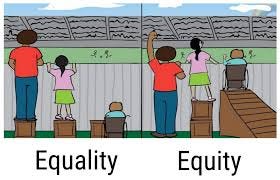better than equal
I had a mini vacation last week. I spent 3.5 entire hours in my car, all ALONE at 6:30 am, in an almost-empty McDonald’s parking lot (with free and fast wi-fi). I was waiting for my mom while she was getting a routine procedure done at a local medical office. It was just me, myself and I in my small contained space, with no multi-tasking to do around the house, dealing with virtual school, never ending home maintenance and the constant barrage of work emails and texts.
I know so many of you can relate to this feeling. Did you know that more than 2 million women had dropped out of workforce by October? Apparently the percent of American women “working” is the lowest since 1988. I assume this is referring to women working in a paid job because we, working moms, are all working more than ever during the pandemic, even if much of it is unpaid and doesn’t make it in as a tangible data point.
Meanwhile, literally on the other side of the world, New Zealand (led by the formidable Jacinda Ardern as its prime minister) recently passed a bill based on the idea of pay equity (not equal pay). Instead of “equal pay for equal work,” pay equity calls for “equal pay for work of equal value,” or “comparable worth.” The core intention of this idea is about the true value of women’s work, given that today’s most underpaid and essential workers are women.
The first time I encountered the concept of equity vs. equality is when my son with special needs started going to public school. Equity is the word of the day in education and this somewhat controversial image is often used to illustrate the difference between equality and equity:
In a way, equity in education seems much more straightforward than equity in the workplace. For example, when I’m fighting for my son’s right to education, I’m fighting for his access to education. But when it comes to pay equity and valuing what’s been traditionally seen as women’s work, I can’t visualize in any simplistic illustration how that’s supposed to reconcile. What further complicates the fact that women’s work is undervalued and underpaid is the reality that women also do a lion’s share of domestic work that does not get quantified or compensated.
While I’m excited and hopeful to see if we can follow the lead of New Zealand, I also question: how do we strive for equity when we don’t even apply the same definition of “work” for men and women in the first place?
I sadly don’t have the answer and will continue to pursue this issue. In the meantime, given the reality that I need to be in a McDonald’s parking lot to take a mini vacation, I’m trying to implement what I call 80/20 hacks in my life. That is, try to be efficient and effective so that 20% of my work will give me 80% of the outcome I need (though I have to admit that this proportion is neatly reversed on many of my days).
Using my superpower of being naively optimistic, my 80/20 hack this week is taking advantage of my many 10 minute gaps in the day to accomplish tasks that can be done in that short amount of time, instead of mindlessly scrolling through the social media (ex. clear out junk emails from the previous night, make yet another complaint call to Verizon, find a Google slide template for a presentation, etc.). This way, I don’t have to angst about not having a big chunk of work time, yet feel like I’ve actually gotten important tasks off my plate.
For today’s What’s Your Wonder, I’m excited to invite Annabel Gatto to the WhiteTable. She’s founder and CEO of Suitably, a professional womenswear brand of work staples. What I love about Suitably’s clothes (aside from being elegant and comfortable) are that they’re machine washable and under $100. As a super pragmatic person who doesn’t enjoy physical or online shopping experience, I feel like Suitably was made for me.
What’s your wonder?
I was bullied when I was young and I remember those days very well. The hurt, the disappointment, the feeling like I didn't belong, those feelings left an indelible mark on me. Those experiences and feelings helped mold me into a person who is always thinking about other people - what they are feeling, what matters to them, what their motives are. Empathy has become my superpower. It allows me to understand the needs of the women in our community and my employees. As a result, I am able to create and lead a brand that empowers them to be the best version of themselves.
How do you take care of yourself (or wish you did)?
My husband and I carve out time at the end of each day to watch a show or read together with our dog, Theodore. This special family time together is my favorite escape from whatever is going on for us professionally.


